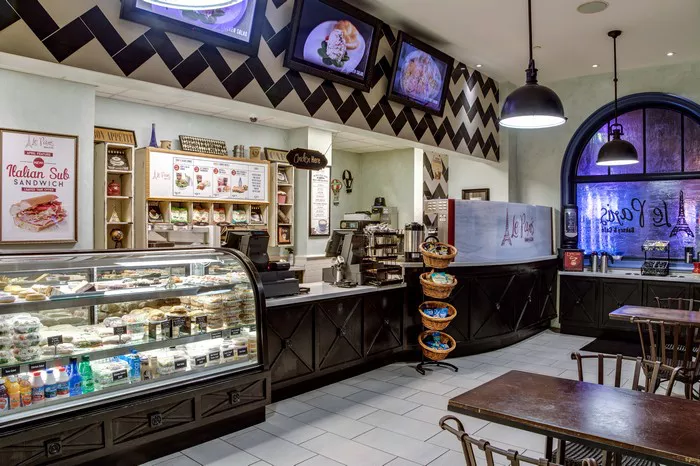A bakery franchise refers to a business arrangement where an individual or group, known as the franchisee, acquires the right to operate a bakery business using the established brand, products, and business model of an existing bakery chain, known as the franchisor. This symbiotic relationship allows the franchisee to benefit from the established success and reputation of the franchisor while following a proven operational framework.
1. Franchise Dynamics: The Partnership Model
a. Franchisor-Franchisee Relationship:
In a bakery franchise, the franchisor, often a well-established bakery brand, grants the franchisee the license to operate their own bakery business under the established brand name.
b. License Agreement:
The arrangement is formalized through a legal agreement, commonly known as a franchise agreement or license agreement, outlining the terms and conditions governing the use of the brand, products, and business model.
2. Utilizing a Recognized Brand:
a. Established Brand Recognition:
The allure of a bakery franchise lies in leveraging the established brand recognition of the franchisor. This recognition is often the result of years of successful operations, marketing efforts, and a positive consumer perception.
b. Consumer Trust and Loyalty:
Consumers are more likely to trust and frequent a bakery with a familiar brand, making a bakery franchise an attractive option for those who wish to tap into an existing customer base.
3. Operational Consistency: A Proven Business Model
a. Replicating Success:
The franchisor provides the franchisee with a proven business model, including operational processes, recipes, and quality standards. This replication of success reduces the risks associated with starting a new business from scratch.
b. Training and Support:
Franchisees receive training and ongoing support from the franchisor, ensuring that they understand and implement the standardized procedures that contribute to the overall success of the bakery.
See Also: Corner Bakery Franchise Opportunity: A Complete Overview
4. Financial Considerations: Balancing Investment and Returns
a. Franchise Fees and Royalties:
In exchange for the right to operate under the established brand, the franchisee typically pays initial franchise fees and ongoing royalties to the franchisor. These fees contribute to the continued support and growth of the franchise system.
b. Profit-Sharing Structure:
While franchisees incur costs associated with the franchise agreement, they also benefit from the brand’s marketing efforts, reputation, and a share of the profits generated by the collective network of franchises.
5. Advantages of Owning a Bakery Franchise:
a. Reduced Business Risks:
Owning a bakery franchise offers reduced business risks compared to starting an independent bakery. The established brand and operational guidelines contribute to a higher likelihood of success.
b. Marketing and Advertising Support:
Franchisees benefit from the marketing and advertising efforts of the franchisor. National or regional campaigns enhance the visibility of the brand and attract customers to individual franchise locations.
FAQs about bakery franchises
What is a bakery franchise?
A bakery franchise is a business arrangement in which an individual (franchisee) purchases the rights to operate a bakery using the branding, products, and business model of an established bakery chain (franchisor).
How does a bakery franchise work?
In a bakery franchise, the franchisor grants the franchisee the right to use its brand, trademarks, and business model. The franchisee typically pays an initial franchise fee and ongoing royalties in exchange for the support, training, and the right to operate under the established brand.
How much does it cost to open a bakery franchise?
The cost of opening a bakery franchise varies widely depending on factors such as the franchisor, location, size of the bakery, and the specific requirements of the franchise. Costs may include an initial franchise fee, equipment, leasehold improvements, and working capital.
Can I choose the location for my bakery franchise?
In most cases, the franchisor provides guidelines and approval processes for selecting a location. Some franchisors may assist in site selection to ensure that the chosen location aligns with their brand and target market.
What kind of training and support can I expect as a bakery franchisee?
Franchisors typically provide training on various aspects of bakery operations, including product preparation, customer service, and business management. Ongoing support may include marketing assistance, operational guidance, and periodic visits from the franchisor’s support team.
Do bakery franchisees have to use specific suppliers or purchase ingredients from the franchisor?
Many bakery franchises have preferred suppliers or specific product requirements to maintain consistency in quality and branding. Franchisees often benefit from bulk purchasing agreements negotiated by the franchisor.
Can I sell my bakery franchise if I want to exit the business?
The ability to sell a bakery franchise is usually outlined in the franchise agreement. Some franchisors may have specific requirements or approval processes for selling the franchise.
6. Conclusion
In conclusion, a bakery franchise represents a symbiotic business relationship between a franchisor and franchisee. It provides aspiring entrepreneurs with the opportunity to operate their own bakery business under a recognized brand, utilizing a proven business model. The advantages include reduced risks, established brand recognition, and ongoing support from the franchisor. For those with a passion for baking and a desire to enter the entrepreneurial world, a bakery franchise can be a recipe for success.
Related information:

